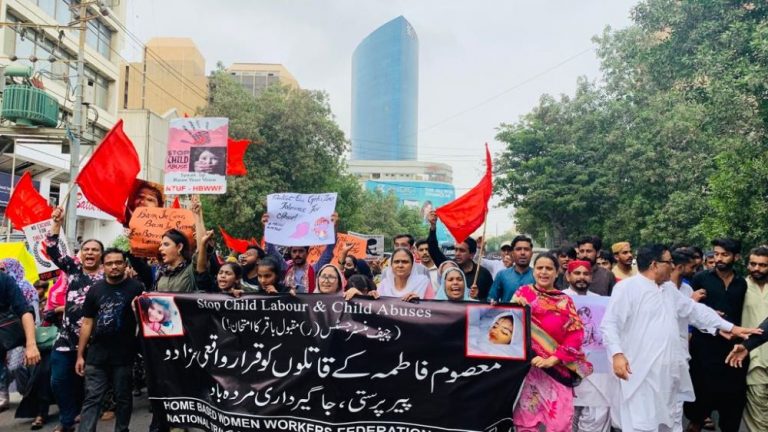
Until the structural foundations that perpetuate inequality and impunity are fundamentally disrupted, the cycle of social crimes and human rights violations will persist
Dr. Shahban Sahito
A string of horrifying murders involving young girls in the Sindh region has cast a dark shadow, inducing profound sorrow among its populace. A recurring and unsettling pattern has emerged from these tragic incidents, with the victims being underage girls under the care of individuals of great influence within society. The most recent case pertains to the tragic fate of 10-year-old Fatima Phuriro, a resident of Khairpur Mirs district in Sindh. Notably, she was associated with the Pir Syed family, with a direct connection to Asad Ali Shah, a member of the revered Ranipur Pir lineage. Though initially attributed to natural causes, subsequent developments, including a viral video, have raised suspicion of potential sexual abuse and alcohol consumption in the presence of Asad Shah within his private chambers. This revelation has ignited widespread public indignation, prompting a concerted response from local authorities.
The arrest of Asad Shah, coupled with the granting of bail to his wife Hina Shah, who is believed to have played a role in the ordeal, underscores the gravity of the situation. Notably, medical examinations conducted after exhuming Fatima’s remains have corroborated signs consistent with sexual abuse and torture, providing a grim confirmation of the suspicions surrounding her untimely demise.
It is the imperative to challenge the prevailing power structures to combat social maladies and criminality effectively
The Ranipur Pirs, holding considerable sway as influential Syed families, have historically occupied positions of power within the National and Provincial Assemblies. This dominance in Sindh has cultivated a socio-political landscape intricately interwoven with the presence of Pirs, tribal chieftains, and feudal lords. Scholars who draw insights from the theories of Karl Marx observe how this power structure influences, if not dictates, societal dynamics, shaping norms, values, and cultural paradigms. Contrary to common misconceptions, culture and traditions are not ethereal and disconnected from power dynamics; rather, they are deeply intertwined.
Michel Foucault’s theoretical framework further illuminates the multifaceted nature of power. Even within progressive societies, power takes on manifold forms, often consolidating among elite echelons. In post-colonial contexts, remnants of colonial legacies endure, allowing the elite and ruling factions to perpetuate dominance by leveraging tribal structures, the influence of Pirs, and tribal affiliations. Pirs, Mirs, and tribal leaders operate with the tacit support of state machinery, cultivating a form of internal colonialism that safeguards established norms and traditions.
The reluctance to disrupt existing power structures is palpable. Over generations, the ruling elite has formed alliances with feudal lords, Pirs, and tribal leaders to maintain their stranglehold on society. This symbiotic relationship ensures the persistence of local elites and the concomitant preservation of the power structure they navigate.
Within this context, instances of grave human rights violations are alarmingly commonplace. Despite these, perpetrators often evade accountability, particularly when these crimes are perpetrated by those belonging to the local elite. There have been instances where the government and law enforcement agencies have demonstrated swift action and justice, but such cases are often the exception rather than the rule. Notably, these exceptions often involve crimes that do not implicate the powerful elite or their allies.
Examining cases such as that of Nazim Jokhio highlights the insidious influence wielded by feudal lords, Pirs, and tribal leaders. This nexus of power not only obstructs justice but also exacerbates societal ills. The Fatima Phuriro case draws alarming parallels with such instances. It serves as a poignant reminder of the potent influence that local elites exert and the hurdles encountered when pursuing justice against those who maintain an entrenched grip on power and privilege.
The root causes of social evils and crimes are deeply enmeshed within the existing power dynamics
The overarching theme that emerges is the imperative to challenge the prevailing power structures to combat social maladies and criminality effectively. The deeply ingrained feudal system, tribal affiliations, and the dominance of Pirs continue to perpetuate existing inequalities. Nevertheless, dismantling these structures requires more than just sporadic efforts; it necessitates the collective mobilization of society, fostering a revolutionary ethos that questions, challenges, and reforms.
The realization is inescapable that the root causes of social evils and crimes are deeply enmeshed within the existing power dynamics. Meaningful progress demands a fundamental reassessment of these structures. Transformation can only be achieved through a systemic shift that dismantles the entrenched power structures, thereby diminishing the influence of the feudal, Pir, and tribal systems.
While the challenges are formidable, the imperative for change is undeniable. Until the structural foundations that perpetuate inequality and impunity are fundamentally disrupted, the cycle of social crimes and human rights violations will persist. The path to transformation necessitates not only an evolution of cultural and societal norms but also a radical reconfiguration of power dynamics. Until this metamorphosis transpires, the journey towards a just and equitable society remains an unfinished endeavor, calling for the collective will of the people to overcome the inertia of tradition and effect meaningful change.
________________
 Dr. Shahban Sahito is Assistant Professor at Department of International Relations, University of Sindh, Jamshoro. Email: shahban.sahito@usindh.edu.pk
Dr. Shahban Sahito is Assistant Professor at Department of International Relations, University of Sindh, Jamshoro. Email: shahban.sahito@usindh.edu.pk